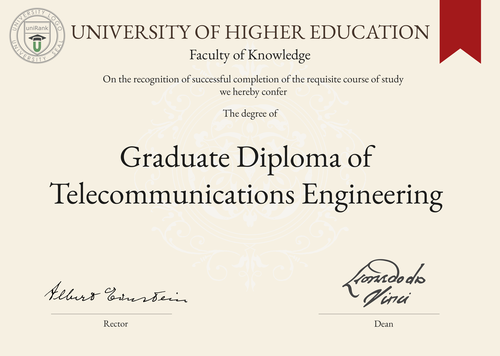
Graduate Diploma of Telecommunications Engineering (Grad. Dip. Telecommunications Engineering)
Guide to Graduate Diploma of Telecommunications Engineering Program/Course/Degree
Graduate Diploma of Telecommunications Engineering (Grad. Dip. Telecommunications Engineering)

Program Name:
Graduate Diploma of Telecommunications EngineeringProgram or Degree abbreviation:
Grad. Dip. Telecommunications EngineeringDuration range:
1-2 yearsTuition range:
Varies depending on the country and universityOverview:
The Graduate Diploma of Telecommunications Engineering program provides students with advanced knowledge and skills in the field of telecommunications. It covers a wide range of topics including network design, wireless communication, data transmission and signal processing.Curriculum Overview by year:
Year 1: - Introduction to Telecommunications Engineering - Network Design and Management - Wireless Communication Systems - Data Transmission and Protocols Year 2: - Advanced Telecommunications Technologies - Signal Processing - Telecommunications Project Management - Elective CoursesKey Components:
- Network design and management - Wireless communication systems - Data transmission and protocols - Signal processing - Telecommunications project managementCareer Prospects:
Graduates of the program can pursue various career opportunities in the telecommunications industry. They can work as telecommunications engineers, network administrators, wireless communication specialists, or project managers in telecommunications companies, government agencies, or research institutions.Salary Expectations:
The salary expectations for graduates of the Graduate Diploma of Telecommunications Engineering program can vary depending on factors such as the country, industry and level of experience. On average, telecommunications engineers earn a competitive salary. For a more accurate understanding of salary expectations, you can utilize the Job Sites Search Engine, from our sister site jobRank, which searches over 4,600 job sites worldwide. Make sure to specify not only the job title but also the country you are interested in.Conclusions:
It is important to note that the program duration, tuition fees, curriculum, key components, career prospects and salary expectations can vary depending on the chosen country or location to study the program, as well as the chosen university. Prospective students are advised to research and compare different options to find the best fit for their needs. Visitors can search for where this specific degree, the Graduate Diploma of Telecommunications Engineering, is offered anywhere in the world through the uniRank World Universities Search Engine.World Universities Search Engine
search for Graduate Diploma of Telecommunications Engineering (Grad. Dip. Telecommunications Engineering) and add the Location (country, state etc.) or specific University you are interested in studying at.
Query examples:
- Graduate Diploma of Telecommunications Engineering (Grad. Dip. Telecommunications Engineering) United States
- Graduate Diploma of Telecommunications Engineering (Grad. Dip. Telecommunications Engineering) United Kingdom online
- Graduate Diploma of Telecommunications Engineering (Grad. Dip. Telecommunications Engineering) Australia international students
- Graduate Diploma of Telecommunications Engineering (Grad. Dip. Telecommunications Engineering) University of California
- Graduate Diploma of Telecommunications Engineering (Grad. Dip. Telecommunications Engineering) University of London tuition fees
- Graduate Diploma of Telecommunications Engineering (Grad. Dip. Telecommunications Engineering) University of Sydney scholarships
Share Program/Course
Interesting? Share this program/course/degree info with your friends now.